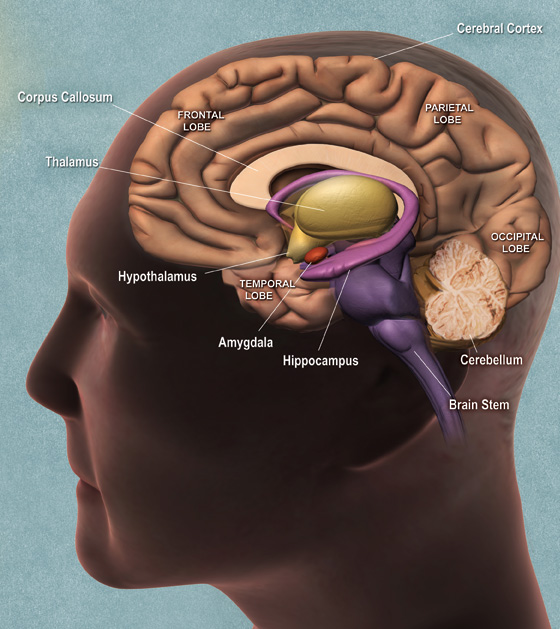The human brain is comprised of 1011 neurons. Neurons are nerve cells that carry information to and from the nervous system to the various organs and systems of the body. These neurons are not distributed uniformly but have common mechanisms of signalling and organization. Neurons form circuits that have several levels of organization and form subsystems.
The human brain is the central control of the nervous system and is highly complex. The human brain is typically three times the size of the brain found in other mammals of an equivalent body size.
The largest part of the brain is the cerebrum which contains the cerebral cortex. Humans have a highly developed frontal lobe that is involved in executive functions such as self-control, planning, reasoning, and abstract thought.

The cerebral cortex
The cerebral cortex is the outer layer of the brain and is bunched up into convoluted folds called sulci to enable a greater area to be enclosed in the skull. The cerebral cortex is involved in memory, language, voluntary movement and attention.
The basal ganglia
The basal ganglia are a bunch of nuclei located at the base of the forebrain and are associated with a variety of functions including voluntary movement, behaviour, eye movement and cognitive and emotional functions. Involvement of the basal ganglia is central to several neurological diseases including movement disorders such as Parkinson's disease and Huntington's disease.
The cerebellum
The cerebellum plays a major role in the control of movement and balance. It is also involved in some cognitive function such as language and attention as well as pleasure and fear responses.
The thalamus
This relays motor and sensory signals to the cerebral cortex and midbrain and is involved in the regulation of sleep, alertness and consciousness.
The hypothalamus
The hypothalamus is a small region that regulates major organ functions. Its main role is to allow for coordination between the nervous system and the endocrine system via the pituitary gland. Certain metabolic processes and other functions of the autonomic nervous system are regulated by hypothalamic hormones that can induce or inhibit the secretion of substances from the pituitary gland to control functions such as sleep, thirst, hunger and attachment behaviours.
Further Reading
Last Updated: Jun 20, 2023